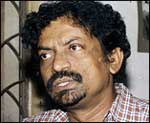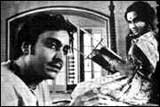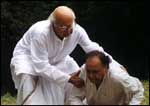'To say I am appalled is an understatement.'
Gautam Ghose is no stranger to the art of filmmaking. He is known for his inimitable style and socialistic touch. Therefore, it's no surprise that his movie Dekha, starring legendary Bengali film actor Soumitra Chatterjee and actress Indrani Haldar, won the best regional film award in this year's National Film Festival.

What's more, Soumitra Chatterjee received the Special Jury Award for his role of a blind poet in
Dekha.
However, Ghose created a furore when he rejected the award following allegations of nepotism and foul play in the National awards.
Chatterjee followed suit.
Pained and embarrassed at the injustices meted out to him, Chatterjee says, "Why should I accept an award that is given merely on lobbying skills? I have been associated with Satyajit Ray for so long, yet no one ever bothered to notice my talent.
"Now they have chosen to appease me at the fag end of my career by announcing a special jury award. I feel insulted. I had rejected an award in the past for the same reasons and my contention remains same even today."
 Equally upset is Ghose, who was the jury president in last year's National Film Festival.
Equally upset is Ghose, who was the jury president in last year's National Film Festival.
The renowned film director now plans to write to the President of India vindicating his refusal of the award for best regional movie.
After a long and tedious pursuit, rediff.com finally caught up with Ghose on the present controversy.
Excerpts from an interview with
Rifat Jawaid:
How do you feel about the controversy that has plagued this year's National Film Festival Awards?
Well, to tell you the truth, I am extremely pained over the fraudulent manner the jurors declared this year's awards. However, my decision to return the award for best regional film for Dekha was not a publicity stunt, for I don't believe in sensationalism. I had to express my anguish and pain at the distressing reports in a section of media, which showed how the jury members had fallen prey to nepotism and lobbying.
To say that I was appalled would be an understatement. It was shocking to see jury members walking out of the Board in protest. Therefore, what I did was natural and a token protest of sorts against all malpractice that has tainted this year's awards.
I am writing to the President of India justifying my stand and suggesting how things may be improved in future. Isn't it a shame that corrupt practices have sullied the National Awards, which are associated with the President?

After all, the same awards were previously known as the President's Awards. To restore their lost glory, we must revamp the entire system under which such prestigious awards are declared.
You were a jury member for two years and headed the jurors last year. Did you ever find actors or participants lobbying for favours?
Yes, but when I functioned as a mere jury member for two years, I only came across passing references to irregularities. Even last year when I headed the Board, there were many instances of people trying to influence jury members. But this year to hadh ho gayee (exceeded all limits).
The truth is out there for everybody to see.
Would you elaborate on what most irked you when you were jury president?
To give you an instance, the manner in which Kiron Kher was adjudged best actress for her role in Bariwali was not technically justified. It was evident during the screening of Bariwali that Kiron had used a dubbed voice. In fact, Rita Koiral, who had given voice for Kiron, claimed it was her (Rita Koiral's) voice in the movie.
I was astonished to see Kiron mention that it was her original voice in the movie in the application form. Since it was stated in her application form, we couldn't do anything. Worse, I was told that even participants influenced the judgments. Some told me that a group of agents influenced the process in Delhi during the Film Festival.
But all these are difficult to be prove. Last year, after announcing the National Awards, I announced in a press conference that I had congratulated those who had lost out at the awards. I did it primarily because none of the judges had been able to evaluate their performances convincingly.
To what extent has this year's controversy affected the credibility of the National Awards?
I think the damage is irreparable. The Director of film festivals and the Ministry of Information and Broadcasting have a lot to do before they can restore the lost glory. They have to revamp the entire system. From selection of jury members, to the duration of viewing for nominated movies, everything must be changed.
What are the suggestions in your letter to President K R Narayanan?
For example, I don't see the logic of short-listing over 150 films for final viewing.
We get more than 150 feature films every year under the Best Films category. After the initial screening, the jurors have to bring the numbers down to over 40. That means that they (the jury members) have to watch at least three movies daily to narrow the numbers down. And this is absurd. I mean, you can't find any Indian feature film less than two hours long.
Imagine the plight of the jurors who spend eight to nine hours watching three movies. Is it possible for them to be in a state of mind whereby they can do justice to their duty? There is no time left for discussing the merits and demerits of the movies in question.
In such a scenario, there is always scope for major slips and mistakes. Therefore, I have suggested that such vast numbers should not be screened. We can have preliminary rounds at a regional level and short list a selected number of films for final viewing.
For a thankless job like this, who will sit for ten hours everyday and screen movies for awards? There is hardly any indepth analysis on the idioms and languages of cinema.
There are times when the jury members themselves are not competent enough to carry out their responsibilities.
Secondly, it's high time we do away with the existing set-up of jury members. There is no need to keep 17 members in a jury. We can do an even better job by minimising the numbers of members to seven-eight. After all, too many cooks tend to spoil the broth.
Have nepotism and lobbying become an inseparable part of the National Awards?
Yes, there is no doubt about that. Otherwise, why would some jury members leave midway?
Do you agree that this year's controversy is interlinked with the RSS and BJP?
I can't really say, but such accusations may be true to an extent. Having said that, I am bothered by the quality of performance. But at the same time, politics should not be allowed to influence what is supposed to be an impartial decision-making process.
Have you watched Daman and Pukaar, for which Raveena Tandon and Anil Kapoor have been given the Best Actress and the Best Actor Awards, respectively?
No, I haven't seen either of their films. Therefore, I can't comment on the legitimacy of the awards received by them.
Do you think Anil and Raveena should return their awards?
Not at all. Why should they? India is a democratic country and both of them have been given the awards after a consensus. Our grudge is against the system and not the individual performers.